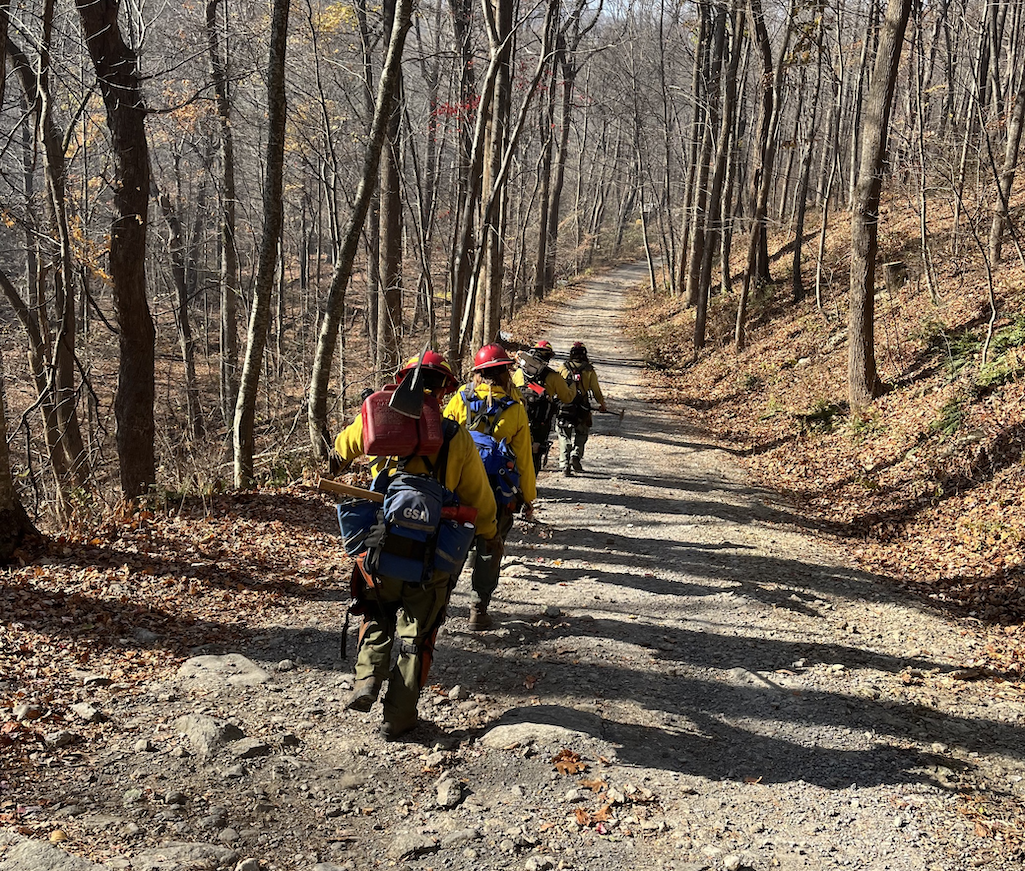
Firefighters traveling along a gravel road at Shenandoah National Park during the Quaker Run Fire/NPS, Kevin Moses
Unseasonably dry conditions have led to fire restrictions and bans in Big South Fork National River and Recreation Area, Great Smoky Mountains National Park, Obed National Wild and Scenic River, and Shenandoah National Park.
Big South Fork National River and Recreation Area, Kentucky/Tennessee
A temporary ban on campfires in the park’s backcountry is in effect. Due to abnormally dry weather conditions and the amount of fresh leaf litter on the ground, the potential for escaped fires to occur in the backcountry has greatly increased, according to park staff.
The fire ban does not affect campers at established campgrounds or picnickers using fire grills at picnic areas. Fires at developed areas must be confined to designated fire rings and grills. All visitors are asked to take certain precautions to help reduce the risk of wildfires. This includes extinguishing frontcountry fires by mixing water with embers in fire rings and grills. Use of backpacking stoves is still permitted at backcountry campsites.
“With the current drought conditions, it is imperative that we mitigate the risk of human-caused wildfires during this period of high fire danger,” said Superintendent Niki Stephanie Nicholas. “The park has not banned backcountry campfires since November 2016, but these unusually dry conditions warrant the restriction."
Great Smoky Mountains National Park, North Carolina/Tennessee
The National Park Service is temporarily banning backcountry campfires in Great Smoky Mountains National Park effective immediately.
“We are experiencing dry conditions throughout the park, in both North Carolina and Tennessee,” said Deputy Superintendent Alan Sumeriski. “With dry conditions persisting over the next week, it is imperative that we reduce the risk of human-caused wildfires.”
The fire restriction only applies to campers using the park’s 100 backcountry sites and shelters. It does not affect campers at the park’s frontcountry (developed) campgrounds or picnickers using fire grills at picnic areas. Fires in developed areas must always be confined to designated fire rings and grills. The NPS asks frontcountry campers to reduce the risk of wildfires by extinguishing fires completely until ashes are cool to the touch. Backpackers may use stoves with compressed gas canisters.
The NPS is working with multiple area agencies in response to current and predicted weather and fuel conditions. Visitors should use extra caution recreating on public lands including national parks and national forests in North Carolina and Tennessee when fire danger is increased.
Obed National Wild and Scenic River, Tennessee
Due to abnormally dry weather conditions and the amount of fresh leaf litter on the ground, the potential for escaped fires to occur in the backcountry has greatly increased. The fire restriction will be in effect until further notice.
The fire ban does not affect campers at Rock Creek Campground or picnickers using fire grills at picnic areas. Fires at developed areas must be confined to designated fire rings and grills. All visitors are asked to take certain precautions to help reduce the risk of wildfires. This includes extinguishing frontcountry fires by mixing water with embers in fire rings and grills. Use of backpacking stoves is still permitted at backcountry campsites.
Shenandoah National Park, Virginia
Building, attending, maintaining or using an open fire anywhere within the boundaries of Shenandoah National Park is prohibited. This ban includes:
- All wood, charcoal, coal or other solid-fuel open air fires.
- Fires in grates, grills, rings or pits in campgrounds, picnic areas, shelters and huts.
Wood, charcoal, coal, or other solid-fuel fires are always prohibited in Shenandoah’s backcountry. This ban extends the prohibition of open fires to picnic areas, campgrounds, and other areas where fires are usually permitted. The use of camp stoves and backpacking stoves will be allowed.
Smoking is prohibited in all areas of the park with the exception of inside vehicles and at established paved or gravel parking areas.
The ban will remain in effect until conditions improve with significant rain or snow over time, decreasing the fire hazard.
Currently, firefighters from multiple agencies are working to suppress a large fire on the park’s eastern boundary.
“We need to be able to dedicate our fire-fighting resources to the Quaker Run fire. We hope a complete fire ban will reduce the possibility of any additional fire activity," said Superintendent Pat Kenney.
As of Tuesday morning, the Quaker Run Fire covered approximately 2,800 acres on private, state, and federal lands, and about 670 acres within park boundaries.
Shenandoah National Park, the Skyline Drive and other facilities and services remain open as scheduled.



Add comment